
The Greek War of Independence, also known as the Greek Revolution or the Greek Revolution of 1821, was a successful war of independence by Greek revolutionaries against the Ottoman Empire between 1821 and 1829. In 1826, the Greeks were assisted by the British Empire, Kingdom of France, and the Russian Empire, while the Ottomans were aided by their North African vassals, particularly the eyalet of Egypt. The war led to the formation of modern Greece, which would be expanded to its modern size in later years. The revolution is celebrated by Greeks around the world as independence day on 25 March every year.

Markos Botsaris was a Souliot chieftain, general of the Greek revolutionary army and hero of the Greek War of Independence. He played a key role in relieving the First Siege of Missolonghi in 1822–1823 and was awarded the title of General of Western Greece by the revolutionary Greek government. He was killed during the Battle of Karpenisi and was buried in Missolonghi with full honors. Today Botsaris is among the most revered national heroes in Greece.

The Battle of Phaleron or Battle of Analatos took place on 6 May 1827, during the Greek War of Independence. The Greek rebel forces were being besieged inside the Acropolis of Athens by Ottoman forces under the command of Mehmed Reshid Pasha. Greek forces outside the city were desperately trying to break the siege.
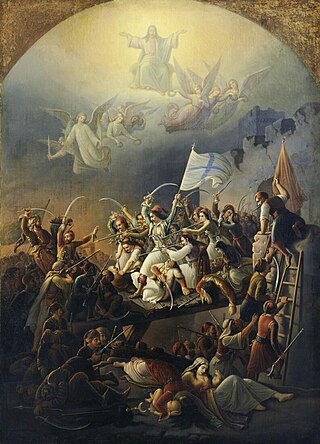
The Third Siege of Missolonghi was fought in the Greek War of Independence, between the Ottoman Empire and the Greek rebels, from 15 April 1825 to 10 April 1826. The Ottomans had already tried and failed to capture the city in 1822 and 1823, but returned in 1825 with a stronger force of infantry and a stronger navy supporting the infantry. The Greeks held out for almost a year before they ran out of food and attempted a mass breakout, which however resulted in a disaster, with the larger part of the Greeks slain. This defeat was a key factor leading to intervention by the Great Powers who, hearing about the atrocities, felt sympathetic to the Greek cause. Their support would prove decisive in helping the Greeks win the war and gain independence.

The armatoles, or armatole in singular, were irregular soldiers, or militia, commissioned by the Ottomans to enforce the sultan's authority within an administrative district called an armatoliki. In Greek regions of the Ottoman Empire, they were composed of Greeks who were either former klephts or village stalwarts who had taken up arms against the klephts in the defense of their district.

Georgios Karaiskakis, born Georgios Karaiskos, was a famous Greek military commander and a leader of the Greek War of Independence.

Alexandros Mavrokordatos was a Greek statesman, diplomat, politician and member of the Mavrocordatos family of Phanariotes.
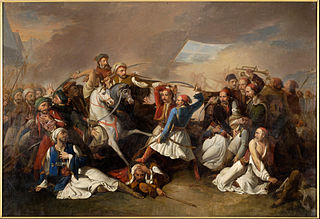
The Battle of Karpenisi took place near the town of Karpenisi on the night of 21 August 1823, between units of the Greek revolutionary army and Ottoman troops.
Mustafa Pasha Bushatli, called Ishkodrali, was a semi-independent Albanian Ottoman statesman, the last hereditary governor of the Pashalik of Scutari. In 1810 he succeeded Ibrahim Bushati and ruled Shkodër until 1831.

Odysseas Androutsos was a Greek armatolos in eastern continental Greece and a prominent figure of the Greek War of Independence.
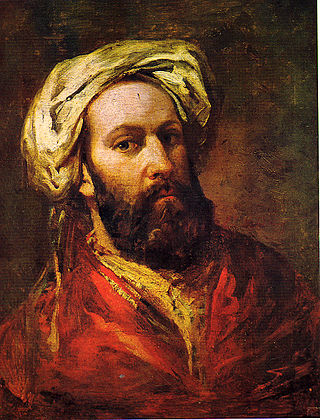
Vizier Omer Pasha Vrioni was an Ottoman Albanian military commander and ruler, and a prominent figure in the Greek War of Independence. He succeeded Ali as Pasha of Yanina.

The Battle of Dervenakia was the Greek victory over the Ottoman forces on 6–8 August 1822, an important event in the Greek War of Independence.

Reşid Mehmed Pasha, also known as Kütahı, was an Ottoman statesman and general who reached the post of Grand Vizier in the first half of the 19th century, playing an important role in the Greek War of Independence.
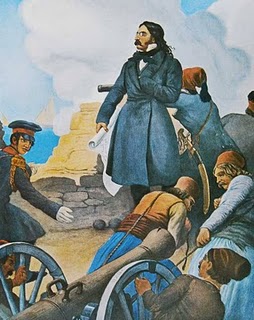
The First Siege of Missolonghi was an attempt by Ottoman forces to capture the strategically located port town of Missolonghi during the early stages of the Greek War of Independence.

There were numerous massacres during the Greek War of Independence (1821-1829) perpetrated by both the Ottoman forces and the Greek revolutionaries. The war was characterized by a lack of respect for civilian life, and prisoners of war on both sides of the conflict. Massacres of Greeks took place especially in Ionia, Crete, Constantinople, Macedonia and the Aegean islands. Turkish, Albanian, Greeks, and Jewish populations, who were identified with the Ottomans inhabiting the Peloponnese, suffered massacres, particularly where Greek forces were dominant. Settled Greek communities in the Aegean Sea, Crete, Central and Southern Greece were wiped out, and settled Turkish, Albanian, Greeks, and smaller Jewish communities in the Peloponnese were destroyed.
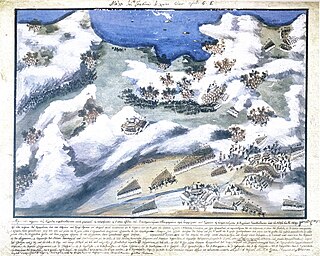
The Battle of Gravia Inn was fought between Greek revolutionaries and the Ottoman Empire during the Greek War of Independence. The Greek leaders Odysseas Androutsos, Yannis Gouras and Angelis Govios, with a group of c. 120 men, repulsed an Ottoman army numbering 8,000 to 9,000 men and artillery under the command of Omer Vrioni and Köse Mehmed. The battle ended with heavy losses for the Ottomans and minimal casualties on the Greek side.

The Second Siege of Missolonghi was the second attempt by Ottoman forces to capture the strategically located port town of Missolonghi during the third year of the Greek War of Independence (1823). The second siege is usually ignored however, and the name is often applied to the greater siege of 1825–1826.

The Souliotes were an Orthodox Christian Albanian tribal community in the area of Souli in Epirus from the 16th century to the beginning of the 19th century, who via their participation in the Greek War of Independence came to identify with the Greek nation.

The First Siege of the Acropolis in 1821–1822 involved the siege of the Acropolis of Athens by the Greek revolutionary forces, during the early stages of the Greek War of Independence.
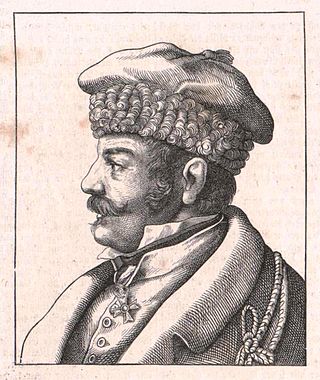
Karl Friedrich Leberecht Graf von Normann-Ehrenfels was a Württembergian soldier who fought in the Napoleonic Wars. As a Philhellene he sailed to Greece to assist the Greek rebels in the Greek War of Independence, and died there of wounds received in the Battle of Peta.



















